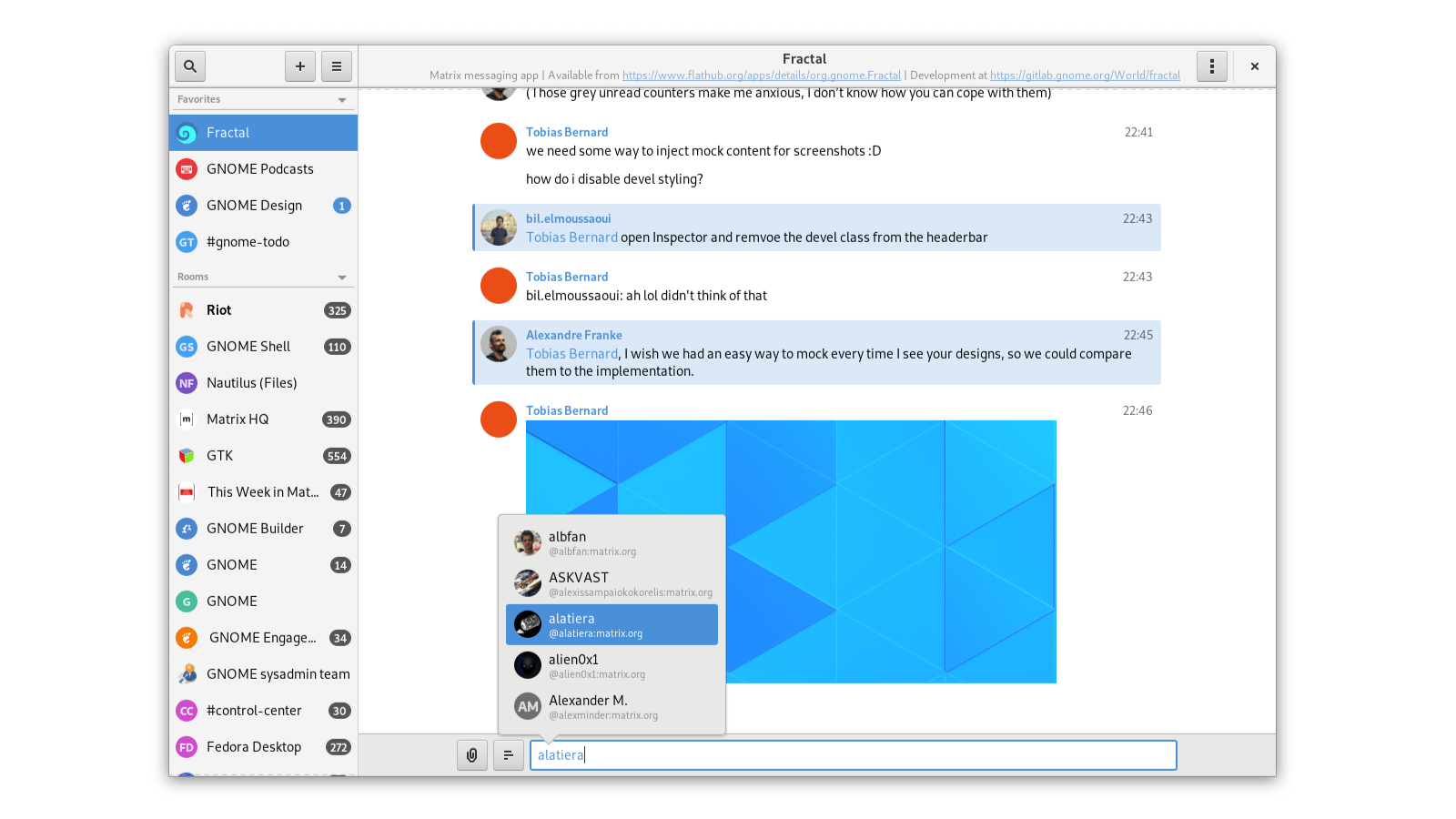Fractal is a Matrix messaging app for GNOME.
Its interface is optimized for collaboration in large groups, such as free software projects.
The developers are in the process of rewriting Fractal from scratch using GTK4 and the matrix-rust-sdk.
Features include:
- Room directory.
- Search joined rooms.
- Room user list
- Display room description.
- Edit room description.
- Highlights.
- Send read.
- Sending invites.
- Accepting invites.
- Typing notification.
- Attachment uploading and downloading.
- Send formatted messages in Markdown.
- Redacting.
Website: wiki.gnome.org/Apps/Fractal
Support: GitLab Code Repository
Developer: Daniel García Moreno and contributors
License: GNU General Public License v3.0

Fractal is written in Rust. Learn Rust with our recommended free books and free tutorials.
Return to Instant Messaging | Return to GUI Matrix Clients
| Popular series | |
|---|---|
| The largest compilation of the best free and open source software in the universe. Each article is supplied with a legendary ratings chart helping you to make informed decisions. | |
| Hundreds of in-depth reviews offering our unbiased and expert opinion on software. We offer helpful and impartial information. | |
| The Big List of Active Linux Distros is a large compilation of actively developed Linux distributions. | |
| Replace proprietary software with open source alternatives: Google, Microsoft, Apple, Adobe, IBM, Autodesk, Oracle, Atlassian, Corel, Cisco, Intuit, and SAS. | |
| Awesome Free Linux Games Tools showcases a series of tools that making gaming on Linux a more pleasurable experience. This is a new series. | |
| Machine Learning explores practical applications of machine learning and deep learning from a Linux perspective. We've written reviews of more than 40 self-hosted apps. All are free and open source. | |
| New to Linux? Read our Linux for Starters series. We start right at the basics and teach you everything you need to know to get started with Linux. | |
| Alternatives to popular CLI tools showcases essential tools that are modern replacements for core Linux utilities. | |
| Essential Linux system tools focuses on small, indispensable utilities, useful for system administrators as well as regular users. | |
| Linux utilities to maximise your productivity. Small, indispensable tools, useful for anyone running a Linux machine. | |
| Surveys popular streaming services from a Linux perspective: Amazon Music Unlimited, Myuzi, Spotify, Deezer, Tidal. | |
| Saving Money with Linux looks at how you can reduce your energy bills running Linux. | |
| Home computers became commonplace in the 1980s. Emulate home computers including the Commodore 64, Amiga, Atari ST, ZX81, Amstrad CPC, and ZX Spectrum. | |
| Now and Then examines how promising open source software fared over the years. It can be a bumpy ride. | |
| Linux at Home looks at a range of home activities where Linux can play its part, making the most of our time at home, keeping active and engaged. | |
| Linux Candy reveals the lighter side of Linux. Have some fun and escape from the daily drudgery. | |
| Getting Started with Docker helps you master Docker, a set of platform as a service products that delivers software in packages called containers. | |
| Best Free Android Apps. We showcase free Android apps that are definitely worth downloading. There's a strict eligibility criteria for inclusion in this series. | |
| These best free books accelerate your learning of every programming language. Learn a new language today! | |
| These free tutorials offer the perfect tonic to our free programming books series. | |
| Linux Around The World showcases usergroups that are relevant to Linux enthusiasts. Great ways to meet up with fellow enthusiasts. | |
| Stars and Stripes is an occasional series looking at the impact of Linux in the USA. | |
All this is great, but I am a single Ubuntu Studio user who wants access to the # or @ GnuCash chat room. I am stopped at the “What is your Provider?” It wants a domain. I have no idea from about an hour of bouncing from one Health Provider or GNOME site on how to install it to another. I will only need access in the rare case GnuCash acts up, so paying for some high priced health industry “provider” seems unreasonable.
Can someone provide a pointer or the instructions for what exactly an individual user of a GNOME based application is to do at this fill in “Matrix provider domain, e.g. myserver.co” since leaving it empty is not acceptable.
It seems your issue has nothing really to do with Linux or Fractal but rather about how to use Matrix. Hence you’d be better to post your question to Matrix itself. Good luck.